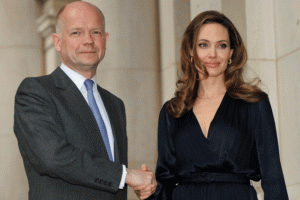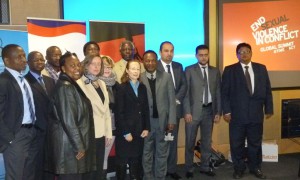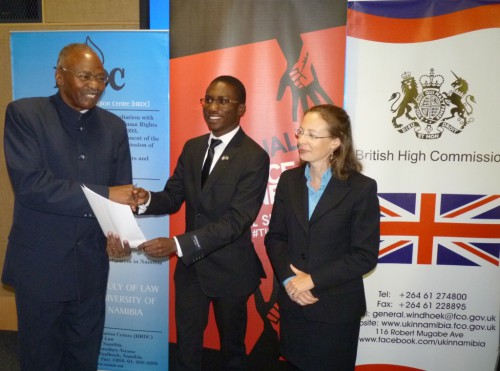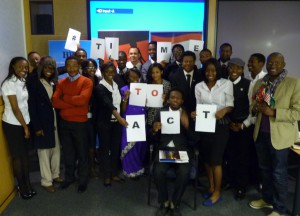10th June 2014 Windhoek, Namibia
#Timetoact on Sexual Violence
Today sees the start of a ground-breaking summit in London to address the continuing scourge of sexual violence in conflict. More than 1,200 delegates, including government officials, international organisations, civil society and international experts are expected to attend the event to help spearhead growing international momentum to halt the use of rape and sexual violence in conflict.
For the UK, preventing sexual violence in conflict is one of our key foreign policy priorities. It is one of the world’s greatest, most persistent and most neglected injustices. Sexual violence in conflict inflicts unimaginable suffering. Sexual violence also represents one of the most serious forms of violation or abuse of an individual’s human rights.

Back in May 2012, UK Foreign Secretary William Hague and Honorary Namibian citizen, UN Special Envoy for Refugees, Angelina Jolie launched the Preventing Sexual Violence Initiative (PSVI). The initiative aims to strengthen and support international efforts to respond to sexual violence in conflict – including by enhancing the capacity of countries, institutions, and communities to support survivors and end impunity for perpetrators.
Sexual violence is often one of the first things that happens as soon as conflict or instability take hold. Yet it is usually the last thing to be taken into account by those ending wars or rebuilding nations.
We have once again seen in the recent weeks in Nigeria, that conflict-related sexual violence is a matter of fundamental importance to international peace and security. I am of course referring to the kidnapping of young women by Boko Haram and use of them as a weapon of war.
Despite the devastating personal, social, political and economic consequences of sexual violence in conflict, all too often a culture of impunity exists around rape in war. It is as a taboo subject, commonly regarded as an inevitability of war and a ‘lesser crime’. As such, the stigma for such crimes usually rests not with the perpetrators but with their victims and the levels of support and assistance available are often inadequate.
This needs to change.
As British Foreign Secretary William Hague recently said:
“A society that believes in human rights for all human beings and opportunities for all its citizens cannot know about the way rape is used as a weapon of war and then simply ignore it.”
As part of the exciting journey to address this, in September 2013, the Foreign Secretary Hague launched the Declaration of Commitment to End Sexual Violence in Conflict which has, so far, been endorsed by 2/3 of all UN member states. The Declaration is action-oriented, and expresses a shared commitment and determination to see an end to the use of rape and sexual violence as weapons of war.
In Namibia, gender based violence remains a human rights challenge of endemic proportions. It is estimated that one third of Namibian women have experienced or will experience physical or sexual abuse in their lifetime.
I was therefore delighted to help support a special UN model debate event tackling PSVI at the University of Namibia on Saturday.
Twenty one students worked hard to present a series of lively interventions and debates on this pressing international issue. I was so impressed by the passion and enthusiasm that they poured into the exercise and would like to thank UNAM for hosting it, as well as the Dean of the Law Faculty of UNAM, Professor John Baloro, Acting Head of Multilateral Affairs, Ministry of Foreign Affairs, Ambassador George Liswaniso, UN Country Representative, dear Timothy Bandora, and my fellow members of the Diplomatic Corps for taking part.

Special thanks should also go to the key organisers, Gawie Kanjemba and his team of Under Secretaries, and Director of the UNAM Human Rights and Documentation Centre of the UNAM Law Faculty, John Nakuta, and staff of the Human Rights and Documentation Centre.
As the summit opens today in London, with a special focus on youth, I hope that the timely Youths for Human Rights Namibia Declaration produced at Saturday’s excellent UN Model simulation event will help feed in a valuable voice from the young Namibian participants who gathered in that UNAM hall for such fruitful deliberations this weekend. The declaration will be shared with British Foreign Secretary William Hague and Angelina Jolie as well as with officials from the Namibian Ministry of Foreign Affairs, who have taken it to London in their luggage.
The Namibian government will be represented in London by the High Commissioner to the UK, HE Steve Katjiuanjo, SWAPO Chief Whip, Prof Peter Katjavivi and officials from the Ministry of Defence, Brigadier General Ndjoba and Colonel Amupolo.
In this way the voices of Namibian youth will be fed into the summit and projected onto global stage – and in this way we can all work together to contribute to a lasting solution to this critical matter.

